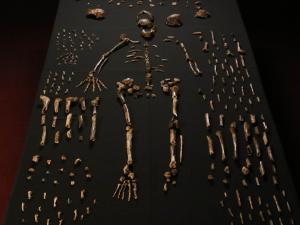PBS: Escaping Eritrea … [Read More...] about ካብ ውሽጢ ቤት ማእሰርታት ኤርትራ
African leaders celebrate H. naledi
Peter Fabricius, 11 September 2015, The Independent (South Africa)
Pretoria – African ambassadors in South Africa are also celebrating the discovery of Homo Naledi, seeing it as further confirmation that Africa is indeed the Cradle of Humankind. The Egyptian ambassador Sherif Naguib said the discovery should inspire all African countries to pool all their scientists and researchers to advance the study of human evolution.
“The discovery of a new species of human relative that was announced by the University of the Witwatersrand, the National Geographic Society, the Department of Science and Technology (DST) and the National Research Foundation of South Africa (NRF) is a great leap in the history of humankind and an important step into understating the evolution of the human beings,” he said.

“The fact that the new discovery was made again in Africa and particularly South Africa must urge African countries to bring together all their scientists and research capacities in order to make Africa a Center of research and study of all scientific disciplines related to human evolution. I am particularly pleased to witness this historic moment during my tenure in South Africa. The new discovery confirms again and again that Africa is the Cradle of Human Kind.
“Our Africa needs the attention of the world in order to preserve its heritage for the benefit of its people and all the people of the world.” “This is really a fantastic fossil discovery. It shows that South Africa is the place to look for the earliest humans,” said Salih Abdu, ambassador of Eritrea. “This is the discovery of a closer relative of ours than Home Erectus. It shows the earliest humans emerged from South Africa and moved to East Africa and beyond. “It adds important new information to the evolutionary tree.”
Rwanda’s High Commissioner Vincent Karega shared his enthusiasm, saying that he celebrated the discovery with South Africa because Wits University and South Africa had provided significant new evidence to support the place of Africa as the source of humanity. “This has contributed very importantly to the role that the continent should continue to play in the development of the world, whether in dealing with climate change, or in science, peace and security, or development.”
Mohamed Fadhel Ayari, ambassador of Tunisia, agreed, saying: “This is marvellous discovery. There is no doubt we can all say now that Africa is indeed the Cradle of humanity. No one can contest that now. “Maybe there are other ‘missing links” still to be discovered elsewhere in the future. But this one will remain among the most important.
“I think that it is good it was discovered in South Africa. This is very important and I hope that all the scientists of the world can come together to study this important discovery.” Barlen Vyapoory, the newly-arrived High Commissioner for Mauritius, said that the place of the discovery – the Cradle of Humankind – was apt. “This discovery tells us we have a common ancestry. And it provides further proof that this is where mankind began.
“It brings Africa to the fore in the attention of the world. So it’s a very important discovery. South Africa is to be congratulated.” Salma Salum, acting High Commissioner for Tanzania, said her country had a special interest in the discovery because of the famous earlier discoveries of hominid fossils in Olduvai Gorge by the Leakeys.
“It’s interesting in that it gives us a deeper background to the origin of our species,” she said.
